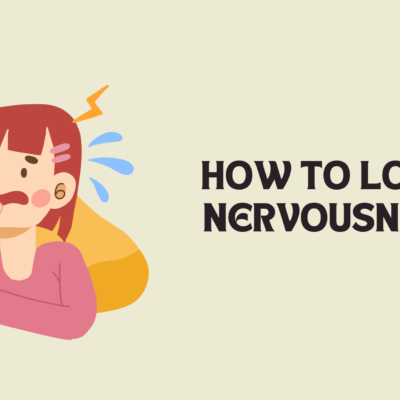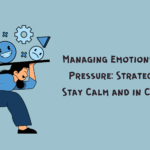How to Lower Nervousness: Nervousness is a natural response to situations that involve uncertainty, pressure, or high stakes. Whether it’s an upcoming job interview, public speaking event, or social gathering, feeling nervous is completely normal. However, excessive nervousness can interfere with performance and overall well-being. Fortunately, there are several effective techniques to lower nervousness and regain a sense of calm. In this article, we will explore practical strategies that help in managing nervousness and fostering confidence.
Also Read:
Understanding Nervousness
Nervousness is a psychological and physiological reaction to perceived threats or challenges. It is triggered by the body’s fight-or-flight response, which releases adrenaline, increases heart rate, and heightens alertness. While this response is meant to protect us, it can sometimes become overwhelming. Recognizing the signs of nervousness, such as sweaty palms, racing thoughts, rapid breathing, and muscle tension, is the first step in learning how to manage it effectively.
1. Practice Deep Breathing Techniques
Deep breathing helps regulate the autonomic nervous system and promotes relaxation. One of the most effective breathing exercises is the 4-7-8 technique, where you inhale for four seconds, hold the breath for seven seconds, and exhale slowly for eight seconds. This method slows the heart rate and reduces anxiety. Practicing deep breathing daily can train your body to respond more calmly in stressful situations.
2. Reframe Negative Thoughts
Negative self-talk can worsen nervousness. If you constantly tell yourself, “I’m going to mess up,” your brain will believe it. Instead, reframe your thoughts with positive affirmations. For example, replace “I’m not good enough” with “I am prepared and capable.” Cognitive restructuring, a technique used in cognitive-behavioral therapy (CBT), helps in identifying and altering negative thought patterns.
3. Prepare and Practice
One of the main causes of nervousness is the fear of the unknown. Preparation can significantly reduce this fear. If you have a presentation, practice it multiple times. If you’re attending an event, research the topics or people you’ll be interacting with. The more familiar you are with the situation, the less intimidating it will feel.
4. Engage in Physical Activity
Exercise is a powerful way to combat nervousness. Physical activity releases endorphins, which act as natural stress relievers. Activities such as jogging, yoga, or even a short walk can help clear your mind and relax your body before a nerve-wracking event. Progressive muscle relaxation (PMR) is another effective technique where you tense and then relax different muscle groups to reduce tension.
5. Visualize Success
Visualization is a mental technique used by athletes, public speakers, and professionals to enhance performance. Close your eyes and imagine yourself succeeding in the situation that makes you nervous. Picture yourself speaking confidently, performing well, or handling challenges with ease. This technique trains your brain to associate the event with positive outcomes rather than fear.
6. Limit Caffeine and Sugar Intake
Caffeine and sugar can increase nervousness by stimulating the nervous system. If you tend to feel jittery before stressful situations, try reducing coffee, energy drinks, and sugary snacks. Instead, opt for herbal teas, water, or foods rich in complex carbohydrates, which provide steady energy without sudden spikes.
7. Use Grounding Techniques
Grounding techniques help bring your focus back to the present moment. One effective method is the 5-4-3-2-1 technique, where you identify:
- 5 things you can see
- 4 things you can touch
- 3 things you can hear
- 2 things you can smell
- 1 thing you can taste This technique helps distract your mind from anxious thoughts and re-centers your attention.
8. Adopt a Healthy Lifestyle
A well-balanced diet, sufficient sleep, and hydration play a crucial role in managing nervousness. Lack of sleep and poor nutrition can exacerbate stress and anxiety. Aim for at least 7-8 hours of sleep per night and maintain a diet rich in proteins, healthy fats, and fiber to keep your energy levels stable.
9. Practice Mindfulness and Meditation
Mindfulness involves staying present and fully engaged in the current moment. Meditation, even for just 5-10 minutes a day, can significantly reduce stress. Techniques such as guided meditation, body scanning, or simply focusing on your breath can help cultivate a calm and resilient mindset.
10. Seek Support and Talk About It
Talking to a trusted friend, family member, or mentor about your nervousness can provide relief. Sharing your concerns helps to gain perspective and receive encouragement. If nervousness becomes persistent and impacts daily life, seeking professional guidance from a therapist or counselor can be beneficial.
Conclusion
Nervousness is a natural emotion, but it doesn’t have to control your life. By incorporating deep breathing, positive self-talk, visualization, physical activity, and mindfulness into your routine, you can significantly reduce nervousness. Preparing well, limiting stimulants, and seeking support further enhance your ability to stay calm under pressure. With practice and consistency, you can develop confidence and handle any situation with ease. The key is to acknowledge your nervousness, address it with effective strategies, and trust in your ability to navigate challenges successfully.








